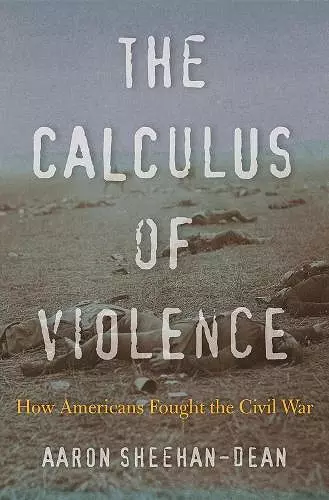The Calculus of Violence
How Americans Fought the Civil War
Format:Hardback
Publisher:Harvard University Press
Published:30th Nov '18
Should be back in stock very soon

Winner of the Jefferson Davis Award
Winner of the Johns Family Book Award
Winner of the Army Historical Foundation Distinguished Writing Award
“A work of deep intellectual seriousness, sweeping and yet also delicately measured, this book promises to resolve longstanding debates about the nature of the Civil War.”
—Gregory P. Downs, author of After Appomattox
Shiloh, Chancellorsville, Gettysburg—tens of thousands of soldiers died on these iconic Civil War battlefields, and throughout the South civilians suffered terrible cruelty. At least three-quarters of a million lives were lost during the American Civil War. Given its seemingly indiscriminate mass destruction, this conflict is often thought of as the first “total war.” But Aaron Sheehan-Dean argues for another interpretation.
The Calculus of Violence demonstrates that this notoriously bloody war could have been much worse. Military forces on both sides sought to contain casualties inflicted on soldiers and civilians. In Congress, in church pews, and in letters home, Americans debated the conditions under which lethal violence was legitimate, and their arguments differentiated carefully among victims—women and men, black and white, enslaved and free. Sometimes, as Sheehan-Dean shows, these well-meaning restraints led to more carnage by implicitly justifying the killing of people who were not protected by the laws of war. As the Civil War raged on, the Union’s confrontations with guerrillas and the Confederacy’s confrontations with black soldiers forced a new reckoning with traditional categories of lawful combatants and raised legal disputes that still hang over military operations around the world today.
In examining the agonizing debates about the meaning of a just war in the Civil War era, Sheehan-Dean discards conventional abstractions—total, soft, limited—as too tidy to contain what actually happened on the ground.
Assessing the potential for the escalation of violence in the course of the war, Sheehan-Dean concludes that at many junctures both North and South ‘chose restraint’; he rejects the widespread argument that the conflict evolved from limited to total war… For Sheehan-Dean, exceptions to this pattern prove the rule and illustrate his contention that the conflict ‘could have been much worse.’ -- Drew Gilpin Faust * Wall Street Journal *
Sheehan-Dean has written a remarkable book, with a fresh take on how the Civil War was fought, why it was fought the way it was fought, and how, theoretically, it could have become a much more violent conflict than it was, had each side not been bent on presenting themselves as taking the moral high ground in an effort to curtail any great escalation in violence. -- Michael Pierce * Midwest Rewind *
Perhaps the best thing this reviewer has read about the Civil War in ages. An expertly researched and written history, it examines the dark side of the American Civil War, namely war against civilians, partisan/guerrilla war, and the nasty issues that developed about prisoners of war on both sides. * Choice *
Sweeping and yet also delicately measured, this book promises to resolve longstanding debates about the nature of the Civil War. With its publication, we should be able to put aside old debates about total war or hard war and instead seek to understand the forces that produced a war that could at once seem hard and soft, unbridled and constrained. A work of deep intellectual seriousness. -- Gregory P. Downs, author of After Appomattox: Military Occupation and the Ends of War
The Calculus of Violence is the rare work that compels us to reconsider the Civil War by embracing the history of the conflict in all its complexity. -- Wayne Hsieh, coauthor of A Savage War: A Military History of the Civil War
Confronting some of the most persistent and contentious arguments over the American Civil War, Aaron Sheehan-Dean offers a remarkable breadth of vision and depth of humanity. His unflinching account separates myth from truth, hyperbole from honesty. It is a brave, welcome, and necessary book. -- Edward L. Ayers, author of The Thin Light of Freedom: The Civil War and Emancipation in the Heart of America
- Winner of Jefferson Davis Award 2018 (United States)
- Winner of AHF Distinguished Book Award 2018 (United States)
- Winner of The Tonous and Warda Johns Family Book Award 2019 (United States)
ISBN: 9780674984226
Dimensions: unknown
Weight: unknown
480 pages